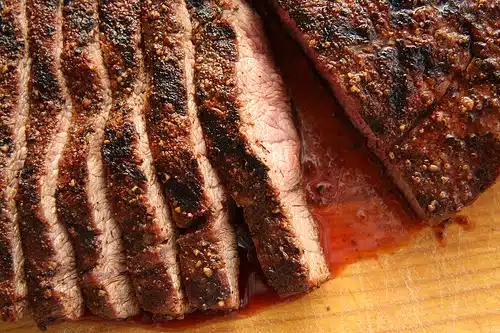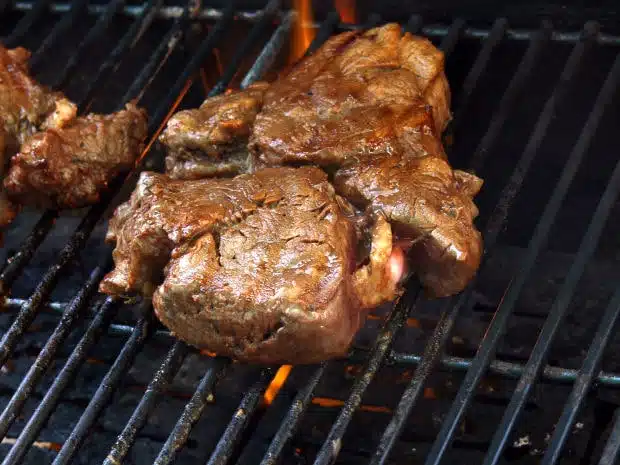
The Carnivore Diet – have you heard of it? If you’re a fan of Joe Rogan, chances are you have. In fact, his latest episode features Mikhaila Peterson – a food blogger who shares her experience with this diet.
Our very own Joel Runyon also interviewed Mikhaila – listen here:
Think about everything you’ve ever learned about nutrition. Chances are, pieces have changed over the years, while others have stayed more consistent. Maybe you were a fan of the low-fat trend in the 90s or maybe you’re a keto-follower now.
If you’ve kept your eye on anything to do with nutrition, I’m sure you’ve realized that trends come. And then trends go. And what everyone was once hailing as a “superfood” or the “best” diet, was perhaps demonized just a few years later.
This happened with the low calorie diet.
It happened with the low fat diet.
It happened with coconut oil.
It’s kind of just the way of this interesting nutrition world. And when you realize this, chances are you become much more interested in diving down the wormhole of nutrition science and fad diet research. (or maybe that’s just me…)
The carnivore diet is the latest trend to hit the plates of the masses. Spurring off of low-carbohydrate approaches like Paleo and Keto, the carnivore diet is also known as the Zero Carb diet.
If you search #carnivorediet on Instagram, you’ll find more than 36,000 posts tagged with that hashtag. Some of the most popular pictures show dramatic weight loss transformations or plates full of steak, sausage, and salmon. The reddit forum r/zerocarb has 53,000 subscribers.
When I first heard of this diet, I was a little taken aback. “You mean, you eat meat. ONLY meat?!? Like no vegetables…at all??” While I’m a fan of a great steak or some wild-caught fish, I never thought only eating meat would be a thing.
But it is. And it’s blowing up. I had to learn more. And this is why this guide was developed. I give you – everything you need to know about the carnivore diet.
What is the Carnivore Diet?

It’s not complicated. In fact, it might just be simplest diet ever.
All you do is eat animal foods. Ask yourself – did it come from an animal? If it did, you can eat it.
No fruits. No veggies. No plants. No plant matter, even. (Most people still do include coffee, tea, and spices…but nothing outside of that.)
Think about everything you know about the vegan diet and then do the exact opposite.
If you’re a meat-loving, vegetables-are-gross type of person, your eyes might be lighting up right now. Is it possible to eat a diet comprised only of animal foods and be healthy? We’ve always been told that that’s a recipe for disaster – or heart disease.
But some people are arguing that it’s not. The carnivore diet might just be the thing to help you reach all your health and wellness goals.
The carnivore diet gained massive popularity when Dr. Shawn Baker praised its benefits on The Joe Rogan Experience podcast in 2017. An orthopedic surgeon and drug-free athlete, Baker has an impressive list of physical achievements and accolades behind his name – for which he mostly credits the Carnivore Diet.
Listen to Joel and Dr. Shawn Baker on the Impossible HQ podcast:
Since then, people all over the world have hopped on the carnivore diet. As you can imagine, because this diet flips everything we thought we knew about nutrition on its head, the topic is quite controversial.
Carnivore Diet Foods

As you already know, meat is the name of the game. Red meat – rib-eye steaks are a popular choice – but basically anything goes here. Because there are no other foods in your diet to provide you with calories, fattier choices of meat are popular.
Poultry, sausage, bacon, and organ meats are all on the table as well. Fish is fair game too as are eggs and bone broth.
Now, onto the stickier situation of dairy. Dairy technically comes from animals and is permissible while following this diet. That being said, many carnivores avoid dairy products because of the lactose – aka sugar. If dairy is eaten, it is usually in small amounts.
All plant matter is a no-go – except, it seems, coffee and tea. Other than that, nada. No leafy greens. No spices. No berries. No condiments.
There is no calorie counting on this diet. No macro tracking, portioning, or food timing is necessary. As long as the only food you put into your mouth came from an animal, you’re following the carnivore diet.
Carnivore Diet Claims

Whether it’s for weight loss, autoimmune disease management, increased sport performance, digestion improvement, increased energy levels, or something else entirely, the reasons why people adopt the carnivore diet are certainly varied.
Unfortunately, there is not a lot of research to definitively say that this diet is good or bad for you. And, like most everything with nutrition, the answer is probably not so black and white.
There are no guidelines on how to do this diet optimally because it really hasn’t been in the forefront of our societal nutrition conversation.
But there are definitely some interesting case studies out there. One of the most famous advocates of the carnivore diet, outside of Shawn Baker, is Mikhaila Peterson – the daughter of popular YouTuber Jordan Peterson.
Mikhaila was diagnosed with severe rheumatoid arthritis when she was just seven years old. She also suffered from depression, skin issues, and hypersomnia. She reports that adopting a zero carb diet cured her of her issues and brought her back to great health.
Seriously – if you want to hear her somewhat crazy nutrition journey, check her out on Joe Rogan’s podcast. It’s worth the listen.
Most testimonials you find online also herald weight loss as being the first noticeable benefit. As with any low carb diet, weight tends to drop off fast – this being water weight, of course.
In an article on Medium, Andy Lindquist wrote that he lost 30 pounds and approximately 5% body fat in 90 days following the carnivore diet. Jordan Peterson, mentioned above, also had dramatic weight loss results – 50 pounds, to be exact.
So weight loss seems to be very common following this diet. But what about – internal health – specifically regarding numbers from blood work.
Ryan Munsey, a personal trainer, nutritionist, human performance specialist, and thought leader in the wellness space, followed the carnivore diet for 35 days and shared his results on the blog.
You can visit the article if you’d like to go more in depth, but his results showed some interesting findings. His cholesterol read high, but the three different doctors he consulted were not concerned as cholesterol is not well understood.
Furthermore, the ratio of total cholesterol to HDL is increasingly being shown as a better marker for the risk of cardiovascular disease. Munsey’s total cholesterol:HDL was within the optimal range. His triglycerides, HDL:triglycerides, inflammation markers, and blood sugar all came back good.
Munsey also had his stool tested to see if the zero carb diet had any effect on his gut microbiome. This diet obviously contains no fiber – something that we have been told is vital for a healthy gut.
He writes, “At the 1 month mark, my stool showed ZERO dysbiotic flaura in my digestive system and a very favorable array of beneficial bacteria, that according to Christine Rosche ‘have many health-protecting effects in the GI tract including manufacturing vitamins, fermenting fibers, digesting proteins and carbohydrates, and propagating anti- tumor and anti-inflammatory factors.’”
Adam Viskovich shared a similar experience on Twitter. Over 4 years, he had his gut samples tested to see how foods affected his colitis. When he was eating plants, he tested in the 40th percentile. After 4 months following the carnivore diet, that sample showed the 95th percentile. People hypothesize that this may be due to the complete removal of fiber from the diet.
Should We All Go Carnivore?

While the stories around the carnivore diet are certainly interesting, we have to look at the bigger picture.
The research just isn’t there yet. Yes, there are tons of very interesting stories about the carnivore diet changing lives. But you can’t argue with science. And I’d love to see some randomized controlled trials conducted over the course of many years. But that takes time and money, and we just aren’t there yet.
As I said, there are some nutrition facts that have outlast the trends. You can’t argue the research that shows the healing potency of certain nutrients in fruits, vegetables, spices, etc. I’m not of the belief that every person (or any person) needs to remove these foods from their diet – even if plants’ anti-nutrients can be considered irritable.
Personally, I think nutrition is such an individualized topic. What works wonders for one person might not be as wondrous for another. I don’t think there is one approach to eating that every single person on this planet should follow.
Most of the articles I found on the carnivore diet were written by people who used themselves as the experiment. They controlled for as many variables as they could within themselves and their environment, ate only meat for a specific amount of time (usually 30 – 90 days), and reported the results.
For now, that may be the best we can do. There is certainly intriguing evidence that the carnivore diet may just buck everything we know about nutrition science. There are most definitely some cases (in fact, the majority of the cases I read) that showed weight loss, mental clarity, improved blood work, and improved gut flora.
It will be interesting to see if this trend stays around for long. And if it does, what research will come from it. I’ll be keeping my eye out for anything that comes out and will update this article as necessary.
If you want to follow the carnivore diet, but you’re hesitant to jump all the way in, Mark Sisson, from Mark’s Daily Apple, has some great tips on how to optimize it.
Have you heard of the carnivore diet or have you tried it? Please let us know your thoughts or experiences in the comments below.